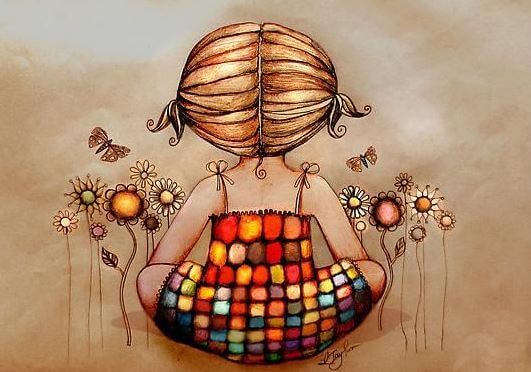Positive Emotions Are the Best Weapon Against Adversity

We teach children to read, write, dress themselves or ride a bike. But, what about their emotions? Educating children about positive emotions can become the key to their happiness. Positive emotions make them more resistant in the face of adversity. People who bend but don’t break when confronted with adversity are capable of experiencing positive emotions even during stressful situations.
Many mental health problems have emotional origins. Misunderstood and repressed emotions harm the body and mind. Emotions are always “taught”, the difference is that they can be taught on their own, be it for good or for bad. Or you can also have a direct and conscious influence upon them. Thus, helping the children understand, transform and regulate their emotions.
Educating your emotions
Educating children about their emotions means you are educating them for life. Emotional intelligence is a set of skills to recognize your own emotions and everyone else’s. Also it allows you to manage them appropriately.

A couple of years ago, emotional education consisted in learning to repress certain emotions. However, we have fortunately slowly started to discover emotional intelligence. We have started to give it its due importance. And that includes the adequate expression of emotions, not their repression.
The ideal way of reducing the future levels of violence and increasing the levels of altruism is to encourage social and emotional learning early on. If a child is capable of identifying their emotions and those of his peers, he will know how to react appropriately to them. This will serve as a foundation from which to improve his social abilities, in order to know what to do and when to do it.
Besides, knowing how to express one’s emotions will prevent a child from feeling voiceless. It will help the child ask for help if he feels in danger or threatened.
“Let us not forget that small emotions are the captains of our lives and we obey them without even noticing.”
-Vincent Van Gogh-
How do positive emotions help us?
Positive emotions promote receptive, flexible and integrative thought patterns. It is very possible that this way of thinking has preceded great discoveries and the most important achievements in the history of mankind.
It is difficult to imagine Michelangelo annoyed as he painted the Sistine Chapel, or an irate Newton as he sat under the apple tree, Edison or Marie Curie depressed in their labs. On the contrary, it is easy to imagine them thinking about possibilities and alternate options, combining incompatible elements, absorbed in their work. Excited as they contemplated their progress towards a desired and meaningful goal.
Along this same line, it has been proven that the diagnoses of hepatic illness were more successful when the doctors were made to feel happy (Fredrickson, 2003). By “more successful” they referred to the fact that in this study the doctors took less time integrating the information of the case. They were less likely to base their conclusion on their initial thoughts. Therefore, they were less likely to make premature or hasty diagnoses.
Positive emotions help us not only feel good about ourselves, but also help us boost our skills and personal competencies. Experiencing positive emotions everyday helps us feel a state of overall happiness.

“Emotions are like wild horses. They are not an explanation that helps us move forward, but instead they are our will to do so.”
-Paulo Cohelo-
We teach children to read, write, dress themselves or ride a bike. But, what about their emotions? Educating children about positive emotions can become the key to their happiness. Positive emotions make them more resistant in the face of adversity. People who bend but don’t break when confronted with adversity are capable of experiencing positive emotions even during stressful situations.
Many mental health problems have emotional origins. Misunderstood and repressed emotions harm the body and mind. Emotions are always “taught”, the difference is that they can be taught on their own, be it for good or for bad. Or you can also have a direct and conscious influence upon them. Thus, helping the children understand, transform and regulate their emotions.
Educating your emotions
Educating children about their emotions means you are educating them for life. Emotional intelligence is a set of skills to recognize your own emotions and everyone else’s. Also it allows you to manage them appropriately.

A couple of years ago, emotional education consisted in learning to repress certain emotions. However, we have fortunately slowly started to discover emotional intelligence. We have started to give it its due importance. And that includes the adequate expression of emotions, not their repression.
The ideal way of reducing the future levels of violence and increasing the levels of altruism is to encourage social and emotional learning early on. If a child is capable of identifying their emotions and those of his peers, he will know how to react appropriately to them. This will serve as a foundation from which to improve his social abilities, in order to know what to do and when to do it.
Besides, knowing how to express one’s emotions will prevent a child from feeling voiceless. It will help the child ask for help if he feels in danger or threatened.
“Let us not forget that small emotions are the captains of our lives and we obey them without even noticing.”
-Vincent Van Gogh-
How do positive emotions help us?
Positive emotions promote receptive, flexible and integrative thought patterns. It is very possible that this way of thinking has preceded great discoveries and the most important achievements in the history of mankind.
It is difficult to imagine Michelangelo annoyed as he painted the Sistine Chapel, or an irate Newton as he sat under the apple tree, Edison or Marie Curie depressed in their labs. On the contrary, it is easy to imagine them thinking about possibilities and alternate options, combining incompatible elements, absorbed in their work. Excited as they contemplated their progress towards a desired and meaningful goal.
Along this same line, it has been proven that the diagnoses of hepatic illness were more successful when the doctors were made to feel happy (Fredrickson, 2003). By “more successful” they referred to the fact that in this study the doctors took less time integrating the information of the case. They were less likely to base their conclusion on their initial thoughts. Therefore, they were less likely to make premature or hasty diagnoses.
Positive emotions help us not only feel good about ourselves, but also help us boost our skills and personal competencies. Experiencing positive emotions everyday helps us feel a state of overall happiness.

“Emotions are like wild horses. They are not an explanation that helps us move forward, but instead they are our will to do so.”
-Paulo Cohelo-
This text is provided for informational purposes only and does not replace consultation with a professional. If in doubt, consult your specialist.







